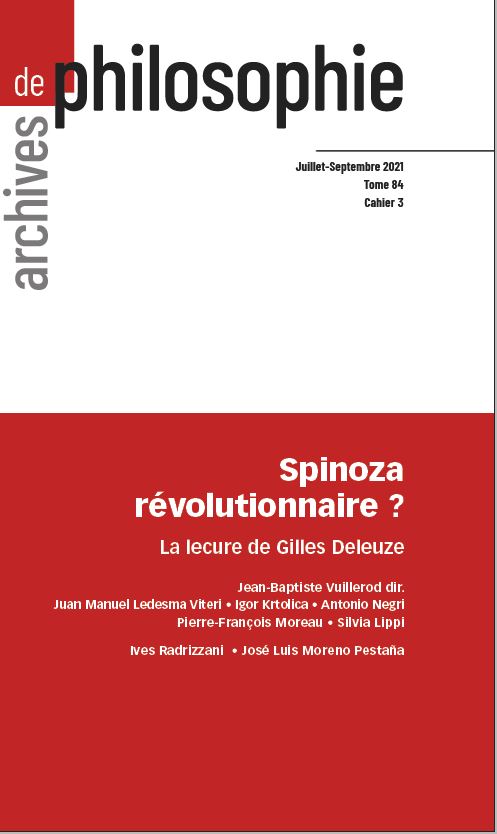 Volume 84, Issue 3, July-September 2021
Volume 84, Issue 3, July-September 2021
Spinoza as a revolutionary? A reading based on Gilles Deleuze
 Jean-Baptiste Vuillerod, Spinoza révolutionnaire ? La lecture de Gilles Deleuze. Avant-propos
Jean-Baptiste Vuillerod, Spinoza révolutionnaire ? La lecture de Gilles Deleuze. Avant-propos
Juan Manuel Ledesma Viteri, Spinoza on eternity and duration: On a comment made by Deleuze in Différence et répétition
This paper aims to offer insight into the construction of Gilles Deleuze’s philosophy from the perspective of its relationship to the philosophy of Spinoza. Starting from a comment on Spinoza found in Différence et répétition, I interrogate both Spinoza’s ontology of time and the genesis of Deleuze’s ontology of difference insofar as it is presented as the direct heir of Spinoza’s doctrine of univocity of being.
Igor Krtolica, Critical philosophy and political philosophy
It is well known that the affinity between Deleuze and Spinoza was precocious, profound, and constant. But the chronology of Deleuze’s work shows that Spinoza’s presence was particularly intense around the 1970s, on either side of Anti-Oedipus and A Thousand Plateaus, the two books that make up Capitalism and Schizophrenia, as if Spinoza framed Deleuze and Guattari’s political philosophy. Therefore, this paper tries to outline this history, showing that the evolution of Deleuze’s interpretation of Spinoza followed the evolution of Deleuze and Guattari’s common political philosophy.
Antonio Negri, Deleuze/Spinoza: A political becoming
This article examines the meaning of the connection between Spinoza and Masaniello made by Gilles Deleuze and Félix Guattari in Anti-Oedipus. We reflect on a revolutionary power that cannot be reduced to the way in which the revolution was thought about in the parties or groupuscules of the Far Left at the time of May 68. Against the ascetic compartmentalization of desire, Deleuze and Guattari invented, thanks to Spinoza, an absolutely new revolutionary mode of being: that of a desiring liberation of nomadic singularities which, by coming together and organizing, create collectives in which power relations and hierarchy do not come back to impede the flows of desire. The disappointment that followed the hopes raised by May 68 can be explained in part by insufficient reflection on the question of the institution and on how to institutionalize these revolutionary powers. The writings of Deleuze and Guattari themselves reveal the impasse of this generation and allow us to better understand what revolution means for us today.
Pierre-François Moreau, From Amsterdam to Naples and back
A detail mentioned in Colerus’s Life of Spinoza suggests that the author of the Tractatus Theologico-Politicus had represented himself in a drawing under the guise of Masaniello, the leader of the 1647 insurrection in Naples. Is this compatible with the critique of revolutions, and particularly of tyrannicide, that we consider to be the lesson of the Tractatus? In fact, Spinoza’s analysis of social upheaval is more subtle: the indignation that sparks uprisings can sometimes be in accord with Reason; the judgment passed on the people differs according to whether they are a slavish mob driven by fear or a free multitude driven by hope.
Silvia Lippi, Schizophrenia and the three kinds of knowledge
Is there a connection between Spinoza’s adequate idea and Freud’s unconscious? We can indeed consider the end of analysis as a journey between the different clinical structures: neurosis, psychosis, and perversion. The schizophrenic is able to realize this journey at once: he crosses the boundary between structures, simultaneously asserting their differences. The problem arises at the level of the social bond, where the schizophrenic is condemned and marginalized: his saying remains outside any established discourse, writes Lacan in L’étourdit. At that point, how can we consider the political force of the schizophrenic’s body without organs? And, according to our hypothesis, why does it belong to the third kind of knowledge?
* * *
Ives Radrizzani, Fichte and the mystical tradition
This contribution aims to investigate the traces of an influence of mysticism in the Fichtean corpus and to define an interpretative framework to explain Fichte’s use of mystical language in The Way Towards the Blessed Life. A careful examination of the various sources reveals that the mystical tradition, and Jacob Böhme in particular, carried by a powerful poetic voice, can play a propaedeutic role with regard to philosophy thanks to their ability to raise the public to the suprasensible, but must also limit their claims in this respect. Fichte does indeed denounce on a philosophical level their dogmatic character and gives them value only when enlightened by criticism.
José Luis Moreno Pestaña, Foucault, Castoriadis, and Athenian democracy
This article examines Foucault’s reading of Athenian democracy in the 1980s and compares it with that of Cornelius Castoriadis. Thus, this article presents a map of interpretations of the figure of Pericles by two philosophers. It shows that our understanding of Foucault’s ideology is more profound than our understanding of the historical reality and political projects of Pericles.
